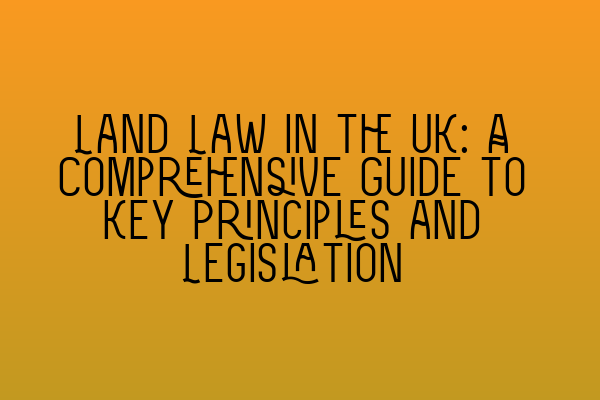Land Law in the UK: A Comprehensive Guide to Key Principles and Legislation
Understanding land law is essential for property owners, developers, lawyers, and anyone involved in the buying, selling, or leasing of real estate in the UK. Land law encompasses a wide range of legal principles and legislation that governs the ownership, use, and transfer of land. In this comprehensive guide, we will explore the key principles and legislation in UK land law, providing you with a solid foundation of knowledge.
The Basics of Land Law
Land law in the UK is primarily based on common law principles, which are rules and legal principles developed and applied by courts over time. However, there are also various statutes and legislation that regulate land transactions and ownership.
The concept of land ownership in the UK is rooted in the principle of “freehold,” where a person owns the land and any buildings or structures on it for an indefinite period. Freehold ownership gives the owner absolute rights over the land, subject to any legal restrictions or obligations.
Leasehold, on the other hand, grants a person the right to use and occupy the land for a fixed period, usually for a specified number of years. Leasehold ownership involves both rights and responsibilities, as the leaseholder must adhere to the terms and conditions set out in the lease agreement.
In addition to freehold and leasehold, land law also recognizes other interests in land, such as easements, covenants, and mortgages. These interests create legal rights and restrictions that affect how the land can be used or transferred.
The Registration of Land
In the UK, land registration plays a crucial role in establishing and protecting property rights. The Land Registry is responsible for maintaining a register of land and property ownership, documenting details such as title deeds, boundaries, and any encumbrances. Registering land provides certainty and facilitates easier property transactions.
Most land in England and Wales is now registered, with a registered title providing conclusive evidence of ownership. However, some older properties may still be unregistered. It is important to check the land registry records to determine the status of the property you are dealing with.
The registration process involves submitting an application to the Land Registry, providing relevant information about the land and its ownership. The Land Registry then examines the application and, if approved, issues a registered title.
Key Legislation in Land Law
Several key statutes and legislation govern land law in the UK. Here are some of the most important ones:
Law of Property Act 1925
The Law of Property Act 1925 is a foundational piece of legislation that consolidated and simplified various aspects of land law. It introduced the concept of registered land and established principles of legal and equitable interests, overriding interests, and co-ownership.
The Act also created the system of land registration and set out rules for the transfer of land and property.
Landlord and Tenant Act 1954
The Landlord and Tenant Act 1954 regulates the rights and responsibilities of landlords and tenants in commercial leases. It provides security of tenure for business tenants, granting them the right to renew their lease and seek reasonable compensation in case of eviction.
This Act also sets out rules for rent reviews, repairs, and other lease-related matters.
Land Registration Act 2002
The Land Registration Act 2002 introduced significant changes to the land registration system in the UK. It aimed to simplify and modernize the process, improve the accuracy of the register, and reduce instances of fraud.
This Act introduced the concept of electronic conveyancing and enabled the Land Registry to keep records in electronic format. It also codified rules on adverse possession and made it easier to rectify mistakes in the register.
Planning and Compulsory Purchase Act 2004
The Planning and Compulsory Purchase Act 2004 governs the planning system in the UK. It sets out procedures and requirements for obtaining planning permission, including the submission of applications, appeal processes, and enforcement of planning decisions.
It also introduced the concept of local development frameworks and sustainable development principles.
Conclusion
Land law in the UK is a complex and dynamic area of law. Understanding the key principles, legislation, and registration requirements is crucial for anyone involved in property transactions or ownership. Whether you are a property owner, developer, or legal professional, a solid foundation of knowledge in land law will help you navigate the intricacies of property rights and obligations.
For further reading and information, be sure to check out SQE 1 Practice Exam Questions, SQE 1 Practice Mocks FLK1 FLK2, SQE 2 Preparation Courses, SQE 1 Preparation Courses, and SRA SQE Exam Dates.
